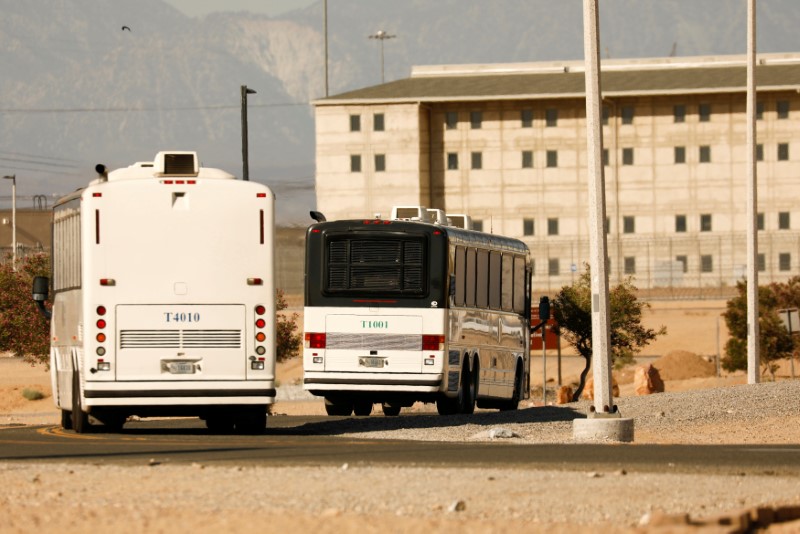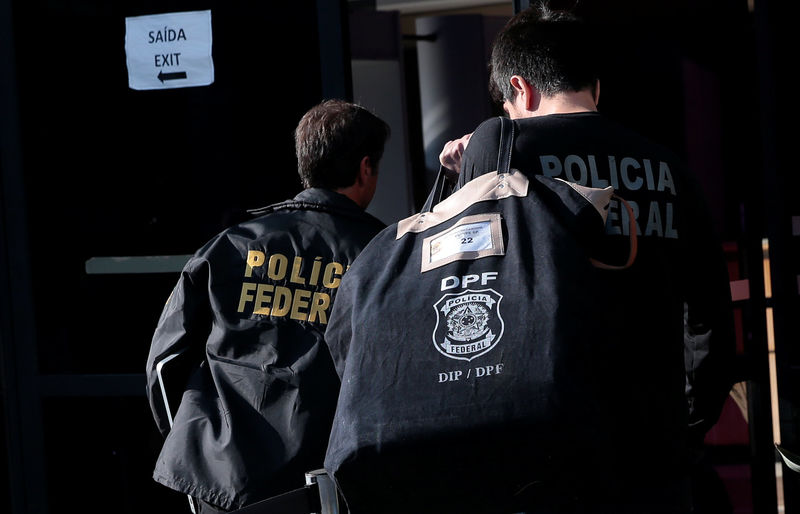
FILE PHOTO: Immigration and Customs Enforcement (ICE) detainees arrive at FCI Victorville federal prison in Victorville, California, U.S. June 8, 2018. REUTERS/Patrick T. Fallon/File Photo
June 21, 2018
By Jan Wolfe
(Reuters) – The much-vilified U.S. policy of separating children from parents who illegally cross the U.S.-Mexico border could continue under certain circumstances because of ambiguous language in President Donald Trump’s order meant to end the practice, legal experts said.
“The first thing that hit me when I read the order was the tremendous amount of wiggle room built into it,” said John Banzhaf, a professor or public interest law at George Washington University.
The order signed by Trump on Wednesday calls for those families to be detained together but it permits separation if deemed that detention with a parent “would pose a risk to the child’s welfare.” Family unity is the policy “where appropriate and consistent with law and available resources,” the order said.
Legal experts said this language could be exploited by the government to separate families on various grounds and be challenged in court, potentially adding to the welter of litigation against Trump’s hardline immigration policy.
Despite Trump’s order, the American Civil Liberties Union said it would press on with a lawsuit arguing the family separation policy violated the Fifth Amendment of the U.S. Constitution, which holds no person can be deprived of life, liberty or property without due process.
A family separated on the basis of a loophole in Trump’s executive order could potentially bring a similar due process challenge.
In April, the administration announced a “zero tolerance” policy that all immigrants apprehended while crossing the border illegally should be prosecuted under the country’s criminal entry statute.
It led to separations of parents and children because when border agents refer apprehended migrants to court, parents are held in federal jail to await trial by a judge while the children either remain in border patrol custody or are moved into facilities managed by the Office of Refugee Resettlement.
Trump’s executive order could allow the government to argue separation was necessary on the grounds that detention facilities were too crowded, for instance, said Greg Siskind, a Memphis immigration lawyer.
The U.S. Department of Justice declined to comment and the Department of Homeland Security did not respond to a request for comment.
CAP ON CHILD DETENTION
On Thursday, the Justice Department asked a court to ease curbs on the detention of children who enter the country illegally with their parents, the most immediate issue facing the executive order.
Indefinite detentions run afoul of the so-called Flores settlement, a 1997 agreement that has been interpreted by courts as requiring children not be detained for more than 20 days.
The administration argued in U.S. District Court for the Central District of California that circumstances had changed.
The surge in the number of illegal border crossings by families had created a “destabilizing migratory crisis” that puts those families at risk and threatens public safety, the Justice Department said.
“Under current law and legal rulings,” the Justice Department said, “it is not possible for the U.S. government to detain families together during the pendency of their immigration proceedings. It cannot be done.”
U.S. District Judge Dolly Gee in Los Angeles, who oversees the Flores settlement, rejected a similar argument by President Barack Obama’s administration in 2015 to extend detentions of families. Republican President George W. Bush and Democrat Obama both increased prosecutions at the border, but this did not lead to family separations because border officials used discretion and did not refer parents for prosecution.
Gee, appointed by Obama and the daughter of Chinese immigrants, said at the time the government had presented no competent evidence its proposed modification would address the problem of increased immigration.
Gee’s ruling would be appealed to the U.S. Court of Appeals for the 9th Circuit, which last year rejected the Trump administration’s travel ban on people from six Muslim-majority countries, part of the crackdown that Republican Trump promised on the 2016 election campaign trail and carried into the White House. Trump also wants to build a wall on the U.S.-Mexico border, but he has failed to secure funding.
Lindsay Harris, a law professor at the University of the District of Columbia, said the administration could be eyeing a longer-term win at the U.S. Supreme Court, which has the power to reverse the 9th Circuit and allow for modification of the Flores settlement.
Congress could also supersede Flores at any time by passing a bill that lays out a legal framework for immigrant families crossing the border, Harris said. She said such a law would probably face a swift challenge under the Fifth Amendment.
The U.S. Supreme Court has held the Fifth Amendment applies to non-U.S. citizens and covers family unity. But the government can point to cases saying separation of families by the criminal justice system is not unconstitutional, legal experts said.
“I predict a lot more litigation on this issue because the executive order does not settle anything once and for all,” said Stephen Yale-Loehr, a law professor at Cornell University.
(Reporting by Jan Wolfe; Additional reporting by Jonathan Stempel; Editing by Anthony Lin and Grant McCool)

